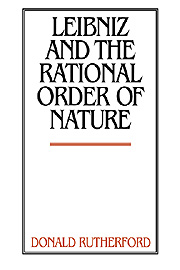4 - Metaphysics and Its Method
Published online by Cambridge University Press: 05 June 2012
Summary
Leibniz offers several definitions of the science of metaphysics. In one work he describes it simply as the “science of intelligibles” (C 556). In another he identifies it as the “science which has being, and consequently God, the source of being, for its object” (GP VI 227/H 243–4). In a third he characterizes “real metaphysics” as involving “important general truths based on reason and confirmed by experience, which hold for substances in general” (RB 431). In a fourth, finally, he says that metaphysics is “the science which discusses the causes of things using the principle that nothing happens without reason.” Although there are significant variations among these definitions, they converge on a common conception. In the first place, metaphysics is the science of “intelligibles”: concepts that owe nothing to sense but are derived solely from reason or intellect. What is distinctly conceivable by the intellect, however, is “being” or possibility, whose reality Leibniz grounds in the ideas of the divine understanding. Thus, insofar as metaphysics is the science of intelligibles, it is also the science of being and the science of divine understanding. Foremost among the intelligible concepts that form the object of metaphysical knowledge is that of substance, or self-subsistent being; hence, truths about “substances in general” form a central part of metaphysics. Finally, to the extent that metaphysics aims at complete knowledge of the nature of beings, it aims at knowledge that is sufficient to explain why everything is the way it is for such beings.
- Type
- Chapter
- Information
- Leibniz and the Rational Order of Nature , pp. 71 - 98Publisher: Cambridge University PressPrint publication year: 1995



